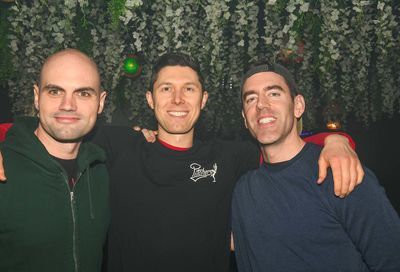Independent Spirit
Kevin Smith's 'Clerks II' is a fine return to form, while Richard Linklater's 'Scanner Darkly' is an experimental adventure
It’s always gratifying to watch independent filmmakers — at least those with talent — reach a point where they’re working within the Hollywood system (meaning their films will reach a mass audience) on what appear to be their own terms. Both Kevin Smith and Richard Linklater reached that point in their careers years ago, and each seems to have acquired the power to dictate the terms of their unique visions.
Each man started out with small, indie crowd-pleasers — Linklater in 1991 with Slackers, Smith in 1994 with Clerks. Of the two, Linklater is more of an auteur — his films combine visual fluidity with an often freestyle stream of dialogue — but Smith is the snappier, funnier writer, a wry (if slightly sophomoric) observer of popular culture. Both have had modest hits, though Linklater unexpectedly hit gold some years ago with the exuberant School of Rock. And while their flops are few, they are at least noteworthy in their awfulness: Linklater’s remake of The Bad News Bears was an idea that should have been abandoned at the conceptual stage, and Smith is still trying to live down 2004’s Jersey Girl, a flubbery romantic vehicle for chum Ben Affleck.
 |
In fact, Smith’s devil-may-care return to the territory that launched his filmmaking career — the self-contained world of two Quick Stop Supermarket clerks — could be viewed as penance for Jersey Girl. The resulting movie, Clerks II, is funny, flip, frequently shocking, sometimes appalling, and always engaging. It rejoins Dante (Brian O’Halloran) and Randal (Jeff Anderson), who have moved on from the Quick Stop (which burns down in the movie’s opening scene), and into a fast food parlor known as Mooby’s (introduced in Smith’s Dogma), which features a grinning cartoon cow as its icon, has an entryway door that emits a sickly moo when opened, and boasts a four-patty behemoth called ”The Cow Tipper.”
The action, if you can call it that, is set on Dante’s last day at Mooby’s. Dante has met a girl whom he’s going to marry and move to Florida with, where he’ll run one of her father’s car washes, but this final day turns out to be far from lackluster, thanks to Randal’s deployment of a going-away present involving a donkey and a leather clad daddy bear with a penchant for interspecies erotica. More critical is a revelation from Dante’s manager, Becky (Rosario Dawson), with whom it’s clear Dante shares an unresolved romantic chemistry.
Of course, what would a Kevin Smith film be without Jay and Silent Bob, the pot-dealing slackers who appear in all of Smith’s films and serve as an all-purpose, wacky diversion? The duo, played by the electrifying Jason Mewes and a tight-lipped Smith, outdo even their nuttiest previous exploits (and that includes the wild ride Jay and Silent Bob Strike Back). Their most outlandish moment is a riotous parody of serial killer Buffalo Bill’s writhing dance from Silence of the Lambs.
Narratively, Clerks II is a bit of a jumble, but here’s the kicker: Smith actually manages to unearth a touching, meaningful conclusion for Dante and Randal, staging a heartfelt sequence set in, of all places, a prison cell. The scene, which is simply masterful, shows how much Smith has matured in 12 years.
Clerks II is nothing if not gratuitous — for that witness the lively discussion on whether or not one should ever go ”ass to mouth.” Occasionally, Smith goes too far. For example, an uncomfortable, offensive riff on racism, while not completely out of place considering Randal’s utter insufferableness as a human specimen, feels like it was included by the director to see if he could actually get away with it. (He almost does.) So perhaps Smith hasn’t matured all that much — he’s still a naughty-boy filmmaker, pushing buttons merely to get a response.
|
O’Halloran remains one of the stiffest actors on the planet, but Anderson’s Randal, a motor-mouthed, sarcastic, an insufferable modern-day misanthrope, is a joy. ”I hate everyone and everything seems stupid to me,” he grumbles. Randal has a new plaything in a God-fearing, 19-year-old Transformers and Lord of the Rings worshipping-nerd named Elias. The poor kid is not only the perfect foil for Randal’s steady stream of abuse, but he actually seems to enjoy walking headlong into it. (Though Elias actually manages to shock the normally unflappable Randal at one point, with talk of a magical little troll known as Pillow Pants.) Trevor Fehrman is pitch-perfect in the role — he’s this movie’s great discovery, the new Jason Mewes. Fehrman, who bats his eyes like a coquettish schoolgirl, endures the film’s most humiliating moment, a masturbatory action enhanced by the hilariously tearful plea, ”Forgive me, Jesus.” Clearly this kid’s game for anything, which is probably why Smith cast him.
Clerks II features a parade of cameos, most of whom have appeared in Smith’s previous works, including Affleck and Jason Lee. But the heart and soul of the film lies in Dante, Randal, Jay and Silent Bob, and newcomers Becky and Elias. These are everyday people for whom life is a repetitive bore. And yet they make the most of it, keeping things fresh by creating their own special magic.
 Drawn together: Reeves and Ryder |
Richard Linklater’s A Scanner Darkly is a far more ambitious film than Clerks II, employing an animation technique the director first used in 2001’s Waking Life. The film is shot using live actors. Then animators, using a process known as rotoscoping, hand-draw and color each frame. The result is a kind of hyper-realism, a view of the world that is both recognizable and incredibly surreal. It’s a comic book come to life.
The technique suits the material, based on a novel by science-fiction scribe Philip K. Dick, providing the story of an undercover cop trying to bring down a drug-ring an unsettling resonance. The drug in question is Substance D, a highly addictive, brain-numbing hallucinogen that, in the future, will seize society like none other (”You’re either on it or you haven’t tried it,” says one addict).
Like most of Linklater’s films, A Scanner Darkly‘s pace is laconic, playing out like a slow Southern drawl. It’s a collection of strung-out, strung-together scenes between the cop Bob Arctor (Keanu Reeves) and his addict-chums, James (Robert Downey, Jr.), Ernie (Woody Harrelson) and Donna (Winona Ryder). Fortunately, all the rambling amounts to a startling moment of clarity at the film’s end.
|
The movie might have benefited from a few more forays into surrealism, like the appearance of a multi-eyed creature who haunts one particularly paranoid character, but the animators more than likely had their hands full creating the ”Scramble Suit,” a garment that conceals the identity of its wearer by rapidly morphing through a zillion different combinations of human beings, incorporating gender, race, age simultaneously. It’s a dazzling, transfixing effect.
The scenes involving Downey and Harrelson have a edgy dangerous feel, but those involving Reeves are, as expected, bland and devoid of any apparent life. Even as a cartoon, the guy can’t act. Reeves notwithstanding, A Scanner Darkly serves its purpose, finding Linklater in experimental mode, which is a far, far better place for him to be than in a little league dugout.
Support Metro Weekly’s Journalism
These are challenging times for news organizations. And yet it’s crucial we stay active and provide vital resources and information to both our local readers and the world. So won’t you please take a moment and consider supporting Metro Weekly with a membership? For as little as $5 a month, you can help ensure Metro Weekly magazine and MetroWeekly.com remain free, viable resources as we provide the best, most diverse, culturally-resonant LGBTQ coverage in both the D.C. region and around the world. Memberships come with exclusive perks and discounts, your own personal digital delivery of each week’s magazine (and an archive), access to our Member's Lounge when it launches this fall, and exclusive members-only items like Metro Weekly Membership Mugs and Tote Bags! Check out all our membership levels here and please join us today!




























